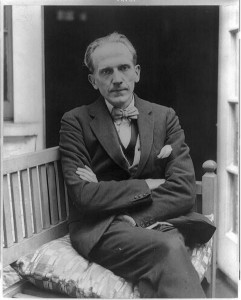Born 1882: A. A. Milne
The author of Winnie-the-Pooh, like Tolkien, served in the British Army in World War I. Their wartime experiences involve some interesting coincidences.
Both A. A. Milne and J. R. R. Tolkien were trained as signals officers.
Both Milne and Tolkien participated in the Somme offensive of 1916. That was not such a great coincidence in itself. The campaign lasted several months, spanned perhaps 15 or 20 miles of trenches, and the British casualties alone exceeded 400,000, so no telling how many troops were involved altogether.
And both Milne and Tolkien contracted trench fever in November 1916 and were returned to England. Tolkien was invalided to England on November 8. That was the date Milne contracted trench fever and was sent back from the front lines. Ten days later Milne was in Southampton, on his way to a hospital in Oxford. He wrote in his autobiography —
I had my men out on a little hill one morning and was walking, as usual, from station (he was a signalling officer) to station to see how the messages were coming through. It was a warm November day, so warm that each station seemed a mile rather than a few hundred yards from the next, and I wondered how I could drag my legs there. At lunch in the HQ mess I went to sleep; spent the afternoon and evening sleeping in front of the stove; and when I went to bed was given the usual couple of aspirins by the M.O. Next morning my temperature was 103. The M.O. went off to arrange for an ambulance to take me to the clearing station. By the time I was introduced to it again the thermometer was soaring to 105. Next day the battalion got the order to move; the attack was to begin. My sergeant came to say goodbye to me. I handed over my maps, commended the section to his care, wished him luck, and went to sleep again. He was lucky. He only lost a leg. Ten days later I was at Southampton. Some kind woman offered to write a telegram for me. It was to [my wife] Daphne, saying that she would find me in hospital at Oxford. I woke up one afternoon and saw her at the end of the bed, crying.
Discover more from File 770
Subscribe to get the latest posts to your email.


“World War I”, the “Great War”, the “War to End All Wars”, summed up in two sentences.
The Battle of the Somme was a meat grinder.
“By the end of the [first] day, the British had suffered 60,000 casualties, of whom 20,000 were dead: their largest single loss. Sixty per cent of all officers involved on the first day were killed.” http://www.bbc.co.uk/history/worldwars/wwone/battle_somme.shtml
As for Tolkien …
“In a program of the BBC the daughter of the late J.R.R. Tolkien told about her supposition that the Journey through the Dead Marshes in ‘The Lord of the Rings’ was in fact a description of the experiences her father had in The Great War.” http://www.lordoftherings.4mg.com/battlesomme.htm
And “World War I” wasn’t used until … 1920. http://en.wikipedia.org/wiki/World_War_I#Names
The Order of the British Empire was instituted in 1917. David Lloyd George, the Prime Minister, became notorious for giving out the various ranks of the order as political favours. In particular, the fourth rank, Officer of the Order of the British Empire (O.B.E.) was notorious for that sort of thing. Milne wrote a poem about it:
http://www.readbookonline.net/readOnLine/37611/
And what chivalric order was Tolkien awarded? He was made an Officer of the Order of the British Empire.
And from these muddy bloody accursed roots sprang some of the sweetest stories in English literature.
Or should I say bittersweetest?
@Joseph: While the coincidence suits the theme of the post, if the message behind Milne’s satirical verse is that people who haven’t been in combat are undeserving of OBE’s, well, Tolkien had been there, hadn’t he? Not that he was made CBE for military service, obviously. The 1972 citation is to “Professor John Ronald Reuel TOLKIEN. For services to English Literature.” (See https://www.thegazette.co.uk/London/issue/45554/supplement/9.)
@Mike: It’s ironic. Milne couldn’t have known.
Of course, I wonder if he ever read THE HOBBIT, and if so, what he thought of it.
(There’s a certain lack of other comments, as it were. I’ve sometime wondered if James Branch Cabell ever read any Tolkien.)
I just thought between Walsh and you I was being outpaced in the research department and needed to make a saving throw…